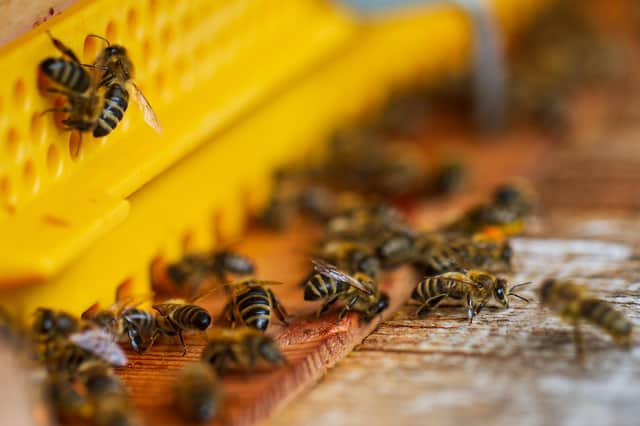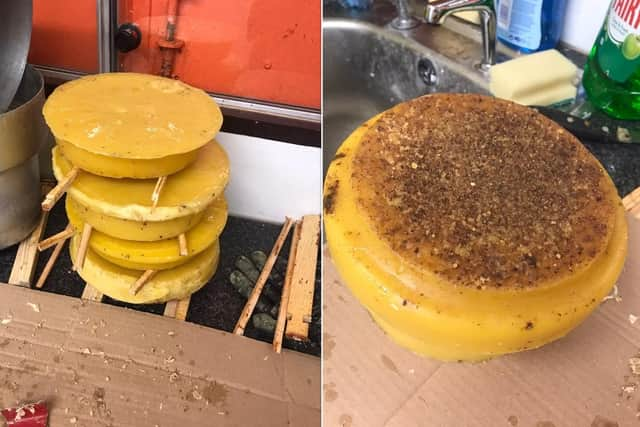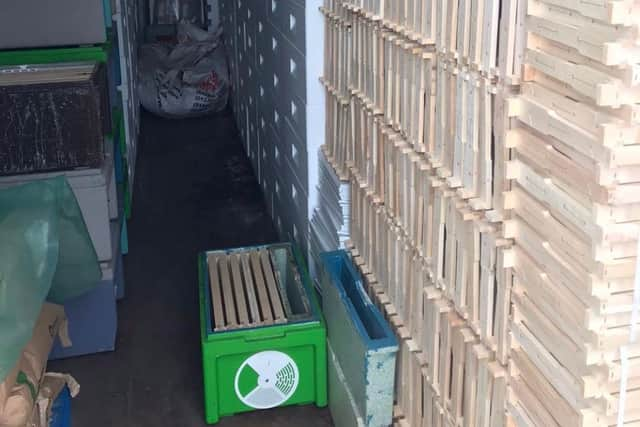Do bees live through winter? Honey business reveals what happens inside a hive during cold winter months


But while the company’s beekeeper Meik Molitor prepares for the season ahead, which will see him tend around 200 hives from the Highlands to Glasgow and the Central Belt, he revealed what goes on inside a hive in winter to keep him occupied.
“Many people think that bees die off in winter but actually they hibernate,” said Meik. “This is, of course, dependent on them not being attacked by any predators, including mice or mites, or running out of food – we use sugar blocks which I mix up myself with apple cider vinegar, citric acid and lemon grass oil.
Advertisement
Hide AdAdvertisement
Hide Ad"It’s good for their guts, and also the sugar absorbs any excess moisture in the hive which can be the second biggest killer to the colony during the cold months. Any sugar blocks which haven’t been consumed are converted into spring syrup for the bees, so there’s no waste at all.


“We do our part before winter cleaning their hives and supplying them with the food, and can only check on food stores and cross our fingers during the winter.”
With many years’ experience in beekeeping behind him, German born Meik can tell how the bees are doing in the winter just by lifting the corner of a hive.
“I go on a dry, warmish day and gently lift the hive at a corner to check the weight,” he said. “I have an instinct by now on how heavy they were before winter, and what they should be. If they are too light for my liking I add some extra food, but they should always have enough as we leave some honey and feed syrup before winter. But milder weather can cause the bees to become more active which automatically will create a higher food consumption.”
Meik explained that mild, wet winters of the type we experience more often now are actually worse for bees than a very cold spell.


“It doesn’t matter how cold it is on the outside, the bees always maintain a temperature inside the hive of around 34 to 35 degrees. They do this by vibrating their wings whilst they rotate in a cluster, meaning that the bees on the outside get cooler, then revert back to the middle to warm up again, it’s really quite fascinating. Our polystyrene hives help them even more with this as they are well insulated, meaning they should not need as much energy and therefore food to generate the temperature.”
At the moment, Meik has around 185 populated hives.
“A five percent loss in winter is always to be expected,” he said. “Before winter, queenless, or smaller colonies get united with another smaller colony to give them a better chance of survival. But cold, wet weather is their biggest threat.”
Between the days of food checks Meik will check on losses by simply gently knocking on the hive, knowing that if he hears humming coming back the bees are still alive.
Advertisement
Hide AdAdvertisement
Hide Ad“If not, I take equipment with me to clean and disinfect a hive to get it ready again for spring. I try not to open any hive before spring though, unless absolutely necessary, as that would do more damage than good.”
With most unpopulated hives already cleaned and disinfected before Christmas, the job now is to start repairing any damaged hives for re-use.
“We also have to embed wax foundations onto frames again,” Meik said. “It’s a lengthy process as some need new wires, and most need tensioned again. You are talking about a few thousand frames. It’s my main job during February.
“We also render more wax which is melted down from old frames and made into candles and soap which we sell in our online shop. Nothing is wasted if we can help it. Beekeeping is a very sustainable business, hence why it’s growing in popularity once again.”
Next for Meik is to visit all his larger hive sites, mainly in Kinross, Scotlandwell and Aberfeldy, where a large fruit farm is a host business.
“I stock up on spare equipment which we keep on site during the season to save time,” he said. “It’s important to get as much preparatory work done before we get really busy in April and May.
Meik also goes into primary schools all over Scotland carrying out Webster Honey lesson plans with schools who choose to host hives for as long as a year as part of extra curricular learning activities. New schools signing up this year are St Paul’s in Shettleston and St Vincent’s in East Kilbride, with Dairsie Primary School in Fife getting involved for the third year running, along with Garrowhill in Glasgow for the second year running.
“I use this time of the year to prepare the theory side of the lesson plans as we cater for all age groups, including nursery age children,” Meik said.
Advertisement
Hide AdAdvertisement
Hide Ad“Going into the schools is one of the best aspects of this job as the feedback I get from the children is brilliant - they absolutely love the hives and finding out all about the lifecycle of the bees. I also love seeing how they decorate the hives as we give them a plain white one. I’m looking forward to seeing some amazing designs in 2022!”
Discover more about the company and beekeeping in general at www.websterhoney.co.uk.